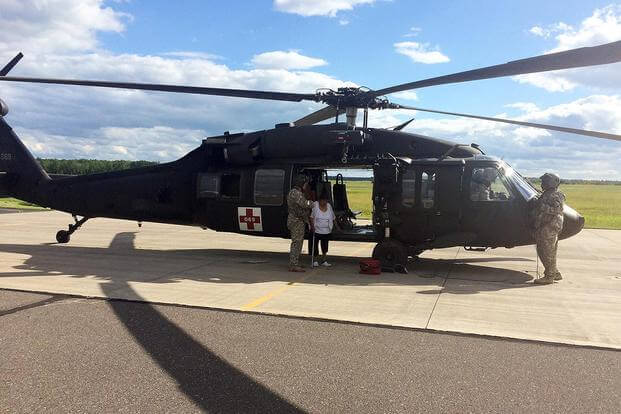MADISON, Wis. — Soldiers from a Wisconsin Army National Guard medevac unit answered the call for help in the aftermath of major flooding in northern Wisconsin this week.
The Bad River Band of Lake Superior Chippewa notified Wisconsin Emergency Management July 13 that five members of the tribe living on the Bad River Reservation needed to find a way to get to their dialysis treatment in Ashland, Wisconsin.
Severe weather, torrential rains and extreme flooding that struck northern Wisconsin July 12 prompted a state of emergency declaration and cut off road access to the reservation, making it impossible for the dialysis patients to travel to medical treatment facilities in Ashland.
Enter the Wisconsin National Guard, which received the mission from WEM and dispatched a UH-60 Black Hawk helicopter from Company F, 2nd Battalion, 238th Aviation to the Bad River Casino parking lot, where the five dialysis patients were waiting. The flight crew took two separate trips to transport the patients to the local airport in Ashland where first responders waited to transport them to the treatment facility.
Four Soldiers from the West Bend, Wisconsin-based flight crew responded to the medevac mission and were grateful for the opportunity to lend a helping hand.
"People were really excited to be able to get the opportunity to help out here, especially on stateside mission where we're flying all the time," said Capt. Robert Hofer, the pilot in command. "The crew did just a phenomenal job. From the start everyone was completely engaged, and the mission went really well."
Hofer noted that the Soldiers in the unit have trained for medevac missions for years. In recent years the unit has conducted extensive military medevac training in exercises and at places like the National Training Center at Fort Irwin, California. Having the chance to apply those skills on a real-world mission where people were in need was a rewarding experience, he said.
"Being able to do what we've trained to do and actually help people in need was really rewarding," he said. "Personally I think the medevac mission is one of the most noble missions that the Army has. So being able to go out there and do it was really great."
He credited his crew with ensuring the dialysis patients were comfortable and well cared for.
"Looking in the back of the aircraft and seeing the people get in, you could see they were nervous at first, but the crew members in the back — Staff Sgt. [Paul] Thomas and Sgt. [Jon] Walsh — really made them feel comfortable about flying on the aircraft," he said. "Our flight medic actually spent a portion of the flight sitting next to one of the ladies who was really scared to fly."
The unit had transported all five of the patients within an hour-and-a-half of receiving the mission.
Residents of the Bad River Reservation were grateful for the Guard's assistance.
"When I saw that helicopter I just started crying because I knew that our people who needed dialysis were going to get help," Esie Leoso-Corbine, the director of social and family services at Bad River, said.
"It was a relief that they were getting the dire medical attention they needed in order to sustain life," she added. "So everyone that was standing there, there were tears coming down."
Fulfilling the medevac mission was at the very core of the National Guard's unique dual-mission as the first military responder in the homeland in times of emergency and as the primary combat reserve of the Army and Air Force. The Soldiers that responded to the medevac mission did so in their traditional Title 32 state status — a status unique to the National Guard that allows Soldiers and Airmen to respond immediately to state emergencies.
The Wisconsin National Guard remains ready to assist as needed. The state of emergency declaration gives the adjutant general the authority to call National Guard Soldiers and Airmen to state active duty, if deemed necessary, though at this point, no Guard members are serving in a state active duty status. The Wisconsin National Guard's Situational Awareness Tool is deployed to northern Wisconsin to monitor and assess the situation on the ground.





























